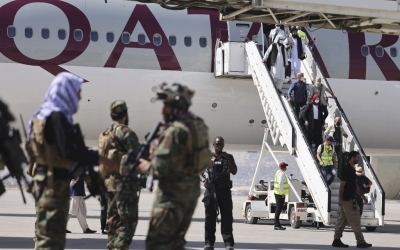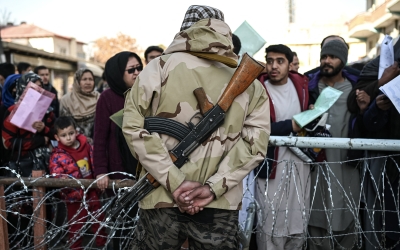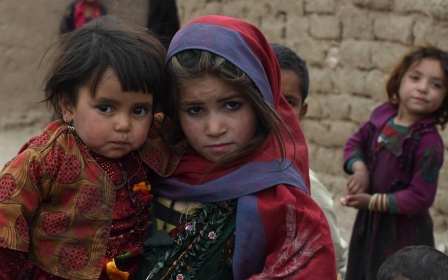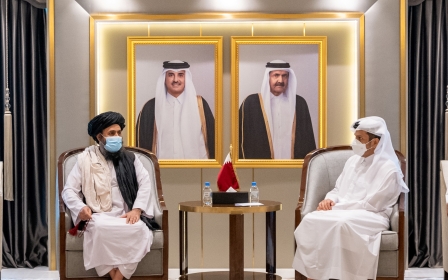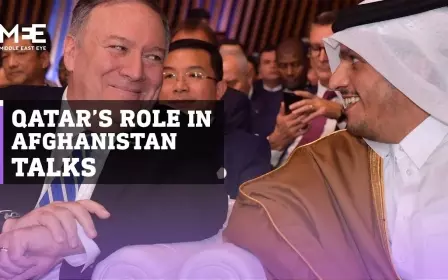Afghanistan: How the UAE-Haqqani link trumped Qatar’s Taliban relationship
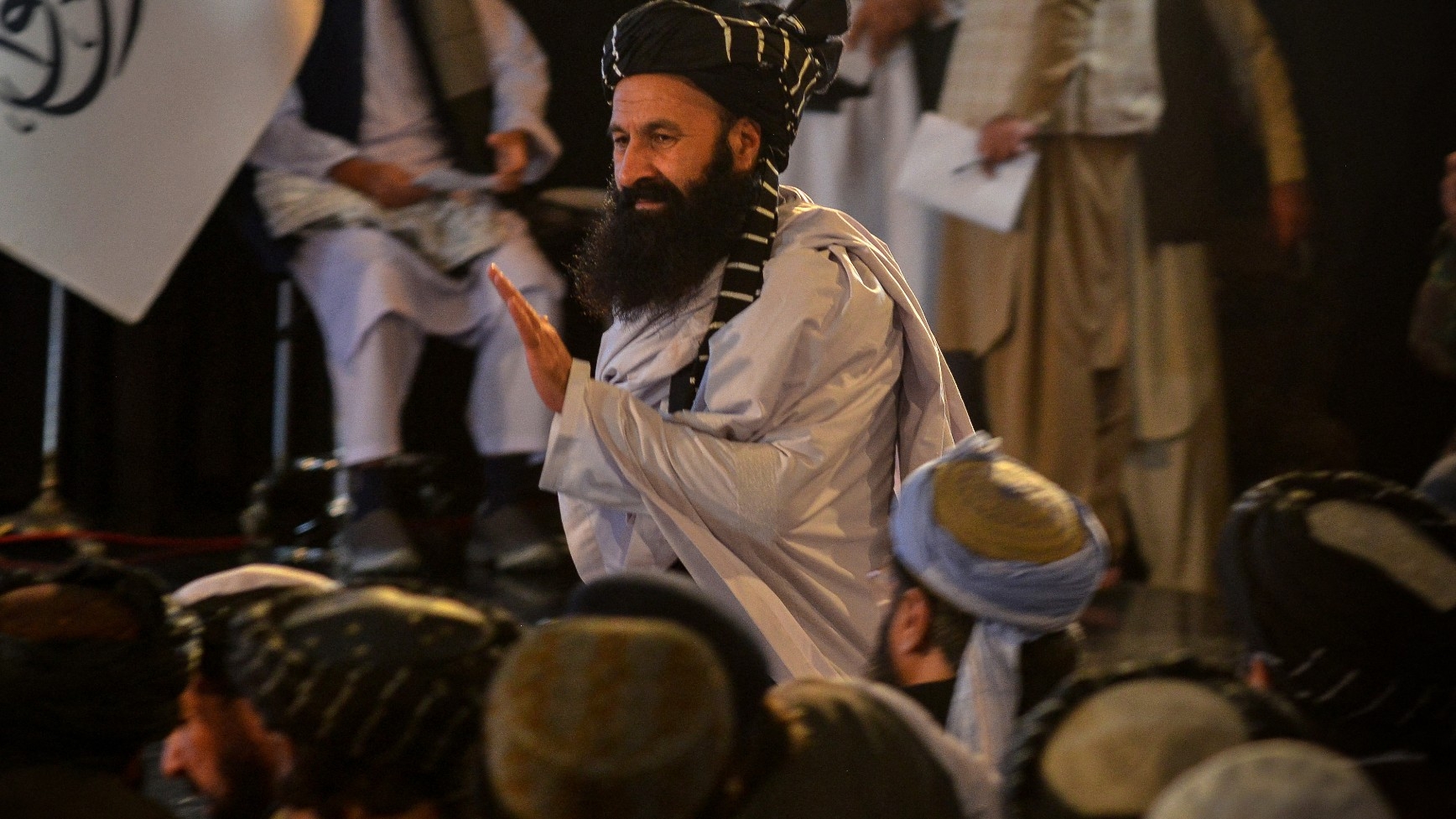
It has been a year since the Taliban seized Afghanistan's capital Kabul after two decades of insurgency.
When it became clear that the proxy government of then President Ashraf Ghani had cowardly abandoned the country and its people, US forces and their allies were left in limbo having to surrender Afghanistan to the Taliban.
For years the United Arab Emirates (UAE) had framed Qatar’s hosting of the Taliban office as direct support of terrorism
Frantically organised evacuation flights by Nato partners just about managed to extract their uniformed personnel leaving behind tens of thousands of local staff and their families who had shared the burden of the western war effort.
Amid this chaos, Qatar seized the opportunity to make use of the networks it had developed with the Taliban it hosted upon US request since 2010.
Qatar suddenly appeared as the most important broker and facilitator in Afghanistan.
New MEE newsletter: Jerusalem Dispatch
Sign up to get the latest insights and analysis on Israel-Palestine, alongside Turkey Unpacked and other MEE newsletters
Apart from organising evacuation flights and hosting Afghan refugees, Qatar brokered bilateral deals for its western partners with the insurgents turning governors. It prompted the US and European partners to relocate their Afghan embassies to Doha, making the Qatari capital the new gateway to Afghanistan.
The soft power success for Qatar was all but expected. Its neighbouring rivals - first and foremost the United Arab Emirates (UAE) – for years had framed Qatar’s hosting of the Taliban office as direct support of terrorism.
In 2017 the UAE and Saudi Arabia even went as far as imposing a blockade on Qatar citing among other things, Qatar’s hosting of the Taliban. But when in 2021 Qatar was able to translate its Taliban links into political capital in the West, Abu Dhabi curiously u-turned on its Afghanistan policy and its stance towards the Taliban.
Another broker
A year on from Qatar’s influence coup, Abu Dhabi curiously emerged as another broker in Afghanistan rivalling Qatar’s influence in an increasingly zero-sum manner. Offering refuge to Ghani, the disgraced Afghan president, in the summer of 2021 was just the first move by Abu Dhabi to keep its foot in the Afghan door.
Since then, Abu Dhabi has re-cultivated personal networks with the Haqqani network – a powerful faction within the Taliban movement that has emerged as the actual kingmaker in Kabul since September 2021.
And unlike Qatar whose leverage over the Taliban is limited to the more pragmatic individuals around the now widely sidelined Mullah Baradar, the UAE have had long-standing ties to the Haqqanis that date back to the 1980s.
The group, founded by Jalaluddin Haqqani, had been the most effective fighting force among the many militant factions in the two-decade-long insurgency against the US-led alliance in Afghanistan.
While the more pragmatic members of the Taliban movement forged political plans in the comfort of Qatari exile, the Haqqanis bore the burden of war in a relentless insurgency against the West. Thus, against Qatar’s hope to see the pragmatists seize key positions in the new Taliban government, it was hardly surprising that the most powerful factions of the movement – the Haqqanis – would take over key portfolios in the new Afghan government.
A power shift
Sirajuddin Haqqani, the son of the network’s founder, became the interior minister controlling key portfolios of internal security and intelligence. It shifted power away from those Taliban who had lived in Qatar for many years and who mostly originated from the Kandahar region.
Abu Dhabi has been eager to cultivate their own networks close to the new kingmakers in Kabul
The ascent of Sirajuddin, who is still on the FBI’s most wanted list, coincides with the decline of Qatari influence over Taliban policies. Many of the formerly Qatar-based Taliban were sidelined in favour of actors who are closer to the tribal networks of northeastern and southeastern Afghanistan.
Meanwhile, Abu Dhabi has been eager to cultivate their own networks close to the new kingmakers in Kabul.
Since the early 1980s all the way through the 2000s, the Haqqani network relied on the UAE as a hub for money laundering and recruitment. Through front companies and a network of trusted Afghan expats, the Haqqanis had built a solid infrastructure in the UAE to finance their operations transforming this Taliban subgroup into the most effective fighting force of the insurgency.
While the Emirates responded to US pressure in 2014 to blacklist the Haqqani network, operations were likely just driven underground with some commentators speculating that the informal money laundering operations of the Haqqanis through the Emirates never stopped.
Personal affection with the UAE was so deep that the network’s founder Jalaluddin took an Arab wife from the Emirates with whom he had at least one son, Sirajuddin, the current Taliban minister of interior. Sirajuddin is believed to have spent extensive periods in the Emirates visiting his mother, learning Arabic and interacting with foreign recruits.
In January 2017 a bomb killed the UAE ambassador and four other Emirati diplomats in Kandahar – an event believed to be executed by Haqqani proxies that put a dent in relations between the UAE and the Haqqanis even if the attack likely did not target the UAE diplomats.
Up for grabs
However, with influence in Afghanistan up for grabs amid great power competition over the central Asian country, the UAE reengaged in Afghanistan in 2021 through humanitarian aid following the takeover of the Taliban.
According to several sources in Kabul, the UAE embassy systematically engaged key proteges of the Haqqani network in their tribe’s eastern Afghan heartland of Khost and Loya Paktia.
UAE diplomats have allegedly built close relations with Khost’s provincial governor who is also believed to be a personal friend of Sirajuddin Haqqani. Other sources claim that the UAE embassy also bonded with Sirajuddin’s personal assistant over the past year.
As Qatari-Turkish negotiations with the Taliban over managing Kabul airport broke down earlier this year over Qatari and Turkish demands to keep running airport security, the UAE had the networks in place to lobby Sirajuddin’s Ministry of Interior to take over the contract. Unlike its competitors, Abu Dhabi did not put any conditions on the contract, allowing the Haqqani network to run airport security.
In the end, a UAE-based consortium, GAAC, won the bid marking a victory for the UAE in its competition with rival Qatar. More so, as Central Asia has become a key ground for the UAE’s mercantile network-building and Sino-Emirati collaboration, it makes sense for Abu Dhabi’s ambitions to become a key Chinese interlocutor in the region.
After all, unlike Qatar, which acted as a widely impartial mediator in the conflict, for the UAE, Afghanistan is right at the heart of their mercantilist grand strategy of connecting logistical nodes and supply chains in Central Asia – something the Haqqani network now running the Taliban is happy to benefit from.
The views expressed in this article belong to the author and do not necessarily reflect the editorial policy of Middle East Eye.
This article is available in French on Middle East Eye French edition.
Middle East Eye delivers independent and unrivalled coverage and analysis of the Middle East, North Africa and beyond. To learn more about republishing this content and the associated fees, please fill out this form. More about MEE can be found here.



